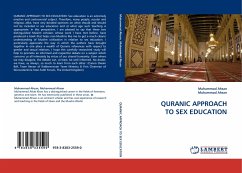High Quality Content by WIKIPEDIA articles! Islam discourages social interaction between men and women when they are alone but not all interaction between men and women. This is shown in the example of Khadijah, who employed Muhammad and met with him to conduct trade before they were married, and in the example set by the other wives of Muhammad, who taught and counseled the men and women of Medina. In some Islamic countries, sex segregation has been or is strictly enforced. In the Muslim world, preventing women from being seen by men is closely linked to the concept of Namus. Namus is an ethical category, a virtue, in Middle Eastern Muslim patriarchal character. It is a strongly gender-specific category of relations within a family described in terms of honor, attention, respect/respectability, and modesty. The term is often translated as "honor".
Bitte wählen Sie Ihr Anliegen aus.
Rechnungen
Retourenschein anfordern
Bestellstatus
Storno








